Miao-yi Tu: The Guardian Angel of Taiwan Hakka Literature
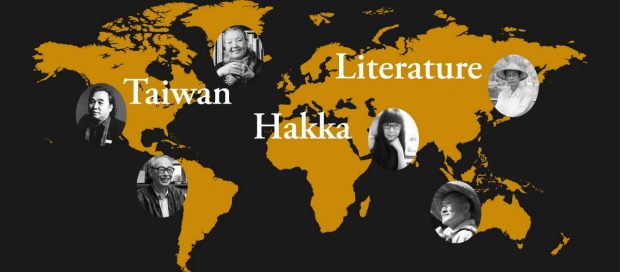
Taiwan Hakka Literature Platform on Facebook
By Ashraf Aboul-Yazid
President, Asia Journalists Association
CAIRO: For a year, Miao-yi Tu has been responsible for recommending translating Hakka literature overseas, and she has been able to get a lot of Hakka literature works published.
Miao-yi Tu is a poet, writer, translator and painter. Currently she is a committee member of Taiwanese Literature Battlefront magazine. She now is the CEO of “Taiwan International Literature Institute”. She was a literature page editor of several newspapers for 9 years. She obtained her BT degree in Chinese literature from National Chung Hsing University, Taiwan.
She participated the International Poetry Festival in Chile, Taiwan, Bolivia, Bangladesh ,Colombia and Ecuador. She was the prize winner in poetry of several literature awards, such as “Tayouan Literary Award”, “Taipei Literary Award”,” Lin Rung-san Literary Award”, “Nan-ying Literary Award”, “Ye-hong Female Poetry Award” etc. Her essay published “Ground is still the Garden” published in 2006 and won the first prize of Fu-cheng Literature Award in 2007. She won the first prize of “Wu Cho Liu Short Story Award” in 2011.
She won the Kathaka Literary Award in 2018. Her Taiwanese poetry collection book published”Yearning” in 2016. Her Madarin/English bilingual poetry collection book “The Epiphany of Feet” published in 2018. Her short stories collection book “The Black Ghost” published in 2019. Her poems translated in English, Spanish, Bengalese, Polish, Arabic, Macedonian and Turkish. Her short stories collection book “The Black Ghost” translated in English and Spanish.
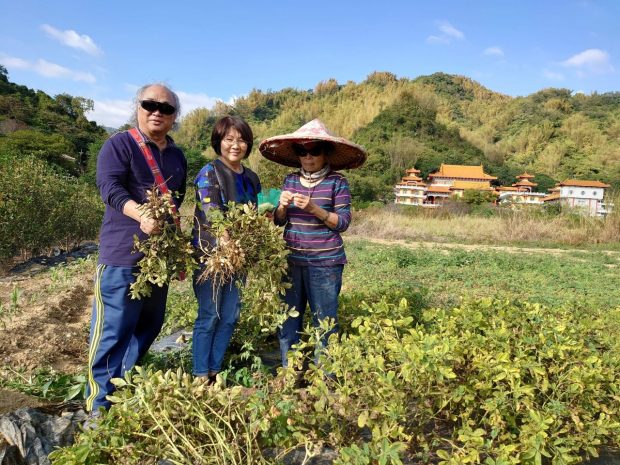
Ching-Fa Wu with wife and friend at the farmland
At Fika Fika Café
It has been raining for several days in Taipei, and Miao-yi Tu walks around to Fika Fika Cafe in Eslite bookstore. The winter rain in Taipei is Inclined. No matter how you get umbrella to holdout that always raining over your body. So after 15 minutes speed-walking she arrived at the Café, totally felt pleased; “It’s free breakfast for buying some books and staffs from Eslite bookstore.” Absolutely happy morning, take her time to enjoy the top 50th Cafe of Asia. She loves sitting in the corner where she observes Taipei city in the early morning. A cup of coffee is a tender begin of the wonderful day: Singing with the clicks of the rain drops on the glass window:
“Oh, rain rain rain.
Oh, Taipei Taipei Taipei.”
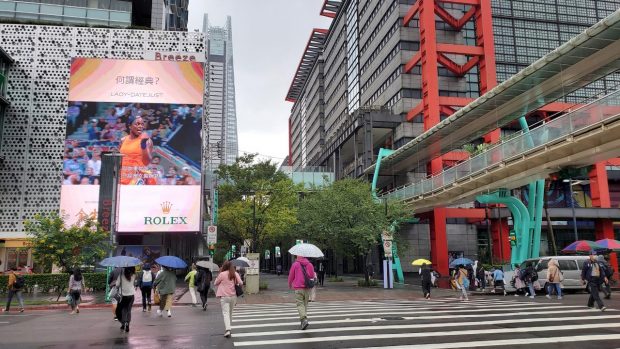
Rains and Umbrellas: Taipei, the capital of Taiwan
If days could start alike for Miao-yi Tu, the poet has a busy schedule for the rest of the day that fits her mission as a guardian angel of Taiwan Hakka Literature. She could be attending an event organized by Tsuyama Publishing Company to present the award ceremony of the Pirate Library in Taipei, hosted by the guest commissioner Miho Nagasu, the director of the Department of Culture, Yong Yingu Nagasu, Shin Hasegawa, Taiwan CEO, Nagasu, were all present. <Left-handed book> Poet’s poetry, author’s passion, homage to the multicultural poet, <Four Seasons Eye>, <Review and waiting for freedom> Two books, Insanatic passion, and the poet.
Hakka Literature : From Taiwan to the World
Generally speaking, there are three criteria (or dimensions) for defining Hakka literature. First, a work contains “Hakka consciousness.” Hakka have their own lifestyle, pattern of behavior, mode of thinking, and values. Second, the author is Hakka. Third, a work is written in the Hakka language of every-day life.
She writes: “Recently, renowned authors Zhang Xiang Fang-Tzu Chang, Zhenghai Kuei-Hai Tseng, Liu Ching-Fa Wu, Hakka TV station, and Jiong Conziin, the main director of Hakka TV station Jiong Conzin, have a very graceful language. I read Bengali with my Bangladeshi friends. It’s fascinating. If you decide to speak Hakka, you can compare Hakka with the new Hakka poet, Miing-Chuan Wu, and see who can speak Hakka better first.
Early bird catches the worm! If many people speak Hakka language, for example, people in Sendai also speak Hak, the beautiful Hak language will not disappear. I pay tribute to the Bengali poet Jahidul Huq studying in Bengali, 2018, walking on the road of Dakka, and came across Bengali letters, like calligraphy, deeply attracted me.”

Ching-Fa Wu with wife and friend at the farmland
Ceremonies and awards
These were some mornings and many afternoons, what about the poet’s evenings?
Let’s follow her steps to the Tainan Literature Award ceremony, meeting he friends: Chang-Ming Chen and Taiwanese poet Cheng-Hsieung Chen. She paid respect and congratulations to the winners of awards such as Mandarin poetry, Taiwanese poem, Taiwanese short story, script and so on.
The mayor of Tainan Mr. Hung came to join this wonderful event. Lots of senior writers participated to congratulate the new winners, including her. She was awarded the same in poetry in 2003, and received contributions award in 2017 about publishing book. She commented: “I’m happy the literature flourishes in my dearest city.”
When she is back home, before dreams, she brings more poetic voices to her Facebook page, and the newly created page for Taiwan Hakka Literature.
I choose two examples of her selections written by Ching-Fa Wu (Taiwan)
“To Be a Forest by Myself”
Only because of loneliness and solitude at first,
In the end,
I was pleased to be a forest by myself.
How many years ago
Was I, by a bird,
Excreted into a dark ravine?
None might have remembered,
Like Jesus, who could not recall the moment in the manger,
When I germinated
And grew up to be so-called a tree.
I remembered nothing.
Darkness,
Darkness—
My memory began as a ray of light entered the murky valley.
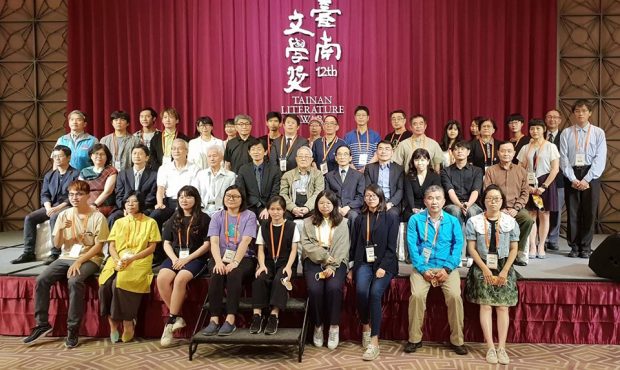
Miao-yi Tu (second row, second seat on the left) in Tainan Literature Award ceremony
Rice by Ching-Fa Wu (Taiwan)
Mom asked someone to bring me a sack of rice
Without leaving any message.
Last week, I went home to see her.
Before I left, She looked into my eyes,
“No need to compromise;
There’re abundant rice at home.”
I was born
while Mom was doing farm work.
Feeling stomachache,
She went home giving birth to me
In a season when rice ears grew.
“After birth, midwife buried your placenta and umbilical cord
In the rice paddy. Mom often chatted about this recently.
Mom sent a sack of rice connecting to my umbilical cord.
How could I eat the rice;
How could I not?
(Translated by Zhengwei Chen)
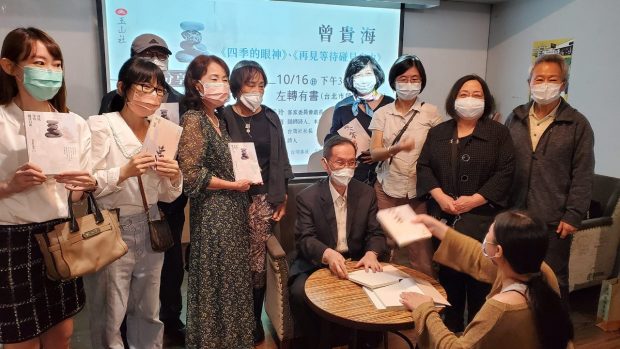
New Hakka poetry book released
Ching-Fa Wu
Ching-Fa Wu is a novelist, a poet, a prose writer, and a reviewer. He was born in Meilnung, Kaohsiung, in 1954, He was news commentator of “The Common Man’s Dily”, Vice Chairperson of Culture Committee, director of Culture Services of Pingtung County. He has published the following collection books: My Mother’s Teahouse ,Autumn Helenium ,Three Steps (novels ). We Human ,The Wind (poetry)…more than 10 books. He is the famous Radio host. His novel My Mother’s Teahouse became a movie and a TV drama.



















































